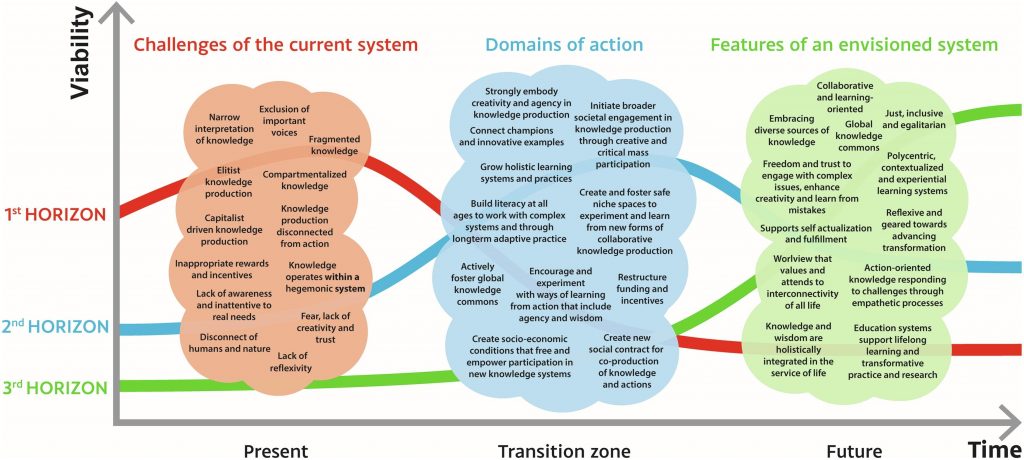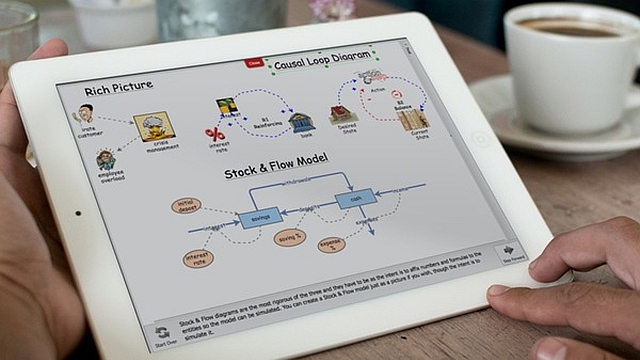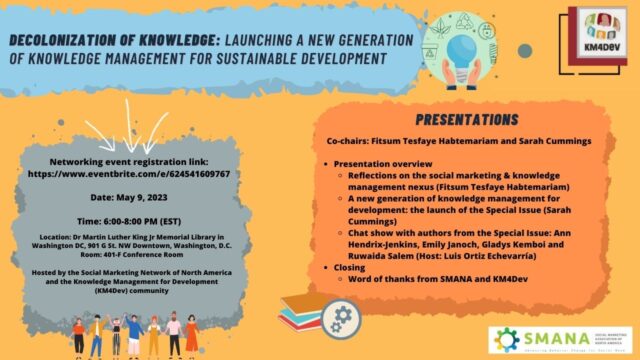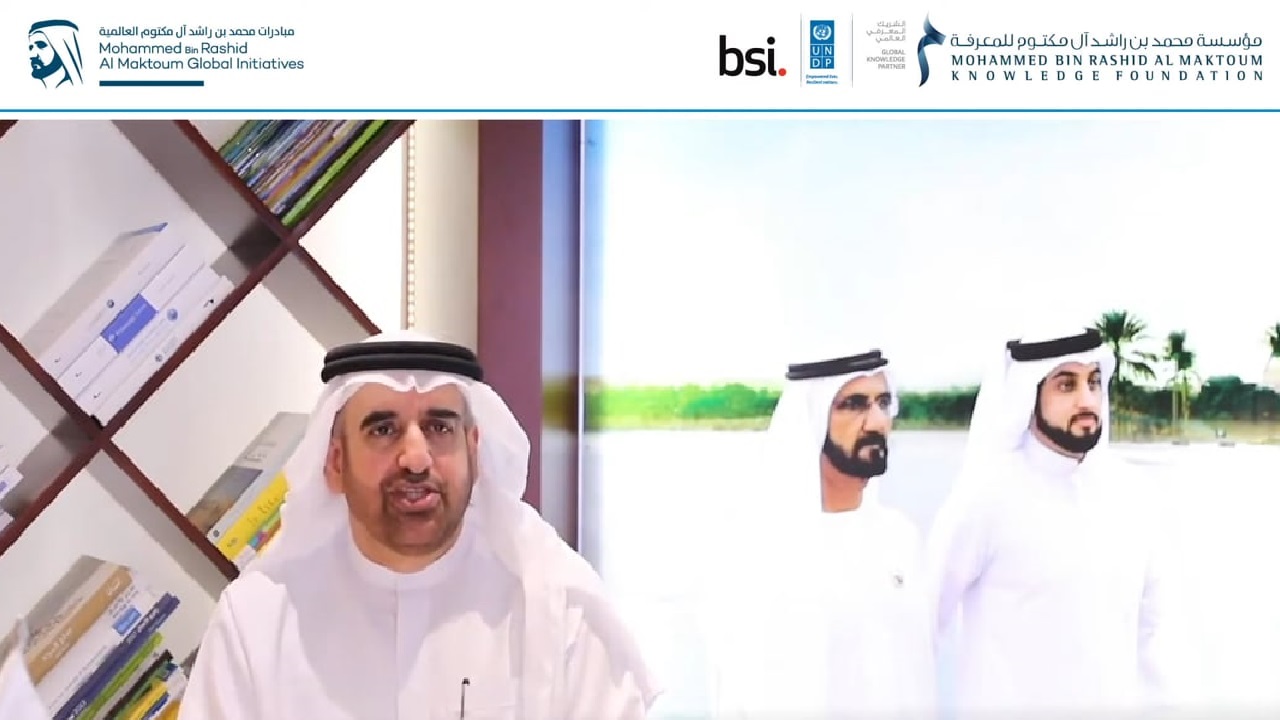
Is it time for transformations towards “Common Good KM”?
The significant recent Integration and Implementation Insights blog article “Visions of knowledge systems for life on Earth and how to get there” and associated paper1 put forward envisioned future knowledge systems to meet the challenges of creating a sustainable future for the planet.
Many of the features of the envisioned future knowledge systems proposed in the article and paper have previously been put forward in knowledge management (KM) literature. For example, in the Knowledge Development Goals of the Agenda Knowledge for Development2 and the “fifth generation of knowledge management for development” research3,4 of Dr. Sarah Cummings and colleagues.
However, what makes the envisioned future knowledge systems proposed in the “Visions of knowledge systems for life on Earth and how to get there” article and paper significant is the ‘how to get there’ transition zone that sets out what is needed to transform from current knowledge systems to the envisioned future knowledge systems, as shown in Figure 1.

Common Good KM?
The envisioned future knowledge systems in Figure 1 align with the idea of “Common Good KM” that I’ve had since reading about the idea of “Common Good HRM” proposed for another management field in another recent paper5. The paper proposes that a new type of sustainable human resource management (HRM) – Common Good HRM – could be essential in driving progress toward addressing sustainable development goals (SDGs) in sustainable HRM.
I’ve since taken the idea of “Common Good KM” back to the “Visions of knowledge systems for life on Earth and how to get there” article authors Niko Schäpke and Ioan Fazey for their thoughts. In reply, Ioan Fazey provides the further example of debates around transformations towards sustainability in another sector – universities.
Second-order science
Ioan Fazey also introduces the concept of second-order science6, which expands science by adding the observer to what is observed. He provides the example of a recent paper7 applying this concept to the facilitation of the transformative changes necessary to avoid catastrophic climate-induced change.
The paper advises that:
Second-order science rejects the assumption that an observer can or should be independent to what is observed. This then leads to the opening up of many possibilities … For example, researchers making choices about how they intervene highlights the normative nature of science and that it occurs in conditions in which truth is not absolute. Acknowledgment of this can then lead to greater acceptance of multiple ways of knowing and recognition of the need for transdisciplinary approaches to science that actively include diverse stakeholders, which then provide new opportunities to learn more directly from and shape action.
What do you think?
Should the KM community begin working towards “Common Good KM”? Should KM researchers be applying second-order science to assist in identifying the transformations needed to achieve “Common Good KM”? Leave your thoughts in the comments section below.
See also: What are the potential knowledge management (KM) disciplines in an interdisciplinary approach to KM?
Header image source: Gerd Altmann on Pixabay, Public Domain.
References:
- Fazey, I., Schäpke, N., Caniglia, G., Hodgson, A., Kendrick, I., Lyon, C., … & Saha, P. (2020). Transforming knowledge systems for life on Earth: Visions of future systems and how to get there. Energy research & social science, 70, 101724. ↩
- Brandner, A., & Cummings, S. (Eds.) (2018). Agenda Knowledge for Development: Strengthening Agenda 2030 and the Sustainable Development Goals, Third Edition. Knowledge for Development Partnership. ↩
- Cummings, S., Regeer, B. J., Ho, W. W., & Zweekhorst, M. B. (2013). Proposing a fifth generation of knowledge management for development: investigating convergence between knowledge management for development and transdisciplinary research. Knowledge Management for Development Journal, 9(2), 10-36. ↩
- Cummings, S., Kiwanuka, S., Gillman, H., & Regeer, B. (2018). The future of knowledge brokering, perspectives from a generational framework of knowledge management for international development. Information Development, DOI: 10.1177/0266666918800174 ↩
- Aust, I., Matthews, B., & Muller-Camen, M. (2020). Common Good HRM: A paradigm shift in Sustainable HRM?. Human Resource Management Review, 30(3), 100705. ↩
- Umpleby, S. A. (2014). Second-order science: logic, strategies, methods. Constructivist Foundations, 10(1), 16-23. ↩
- Fazey, I., Schäpke, N., Caniglia, G., Patterson, J., Hultman, J., Van Mierlo, B., … & Wyborn, C. (2018). Ten essentials for action-oriented and second order energy transitions, transformations and climate change research. Energy Research & Social Science, 40, 54-70. ↩
Also published on Medium.






I think the Three Horizons model is useful and have no qualms with what’s in it, although as always the devil is in the detail to provide the necessary systemic incentives and justify the returns from investing in these activities.
Similarly, I think there’s nothing wrong with considering an organisation you participate in to be both *impacted by* and *impacting on* its environment. Organisations can and do develop ethical frameworks which staff members tacitly align to through their continued employment (although it is worth noting that internal ethical and moral pushback does occur, for example, where individuals delivering frontline services act in a way that subverts official organisational policy).
However the idea that there is a knowable “Common Good”, external to an organisation, that can be implemented for either KM or HRM seems implausible to me. In practice, In any finite system there is always going to be tension among resource allocation. We elect governments to represent “our” common good to the globe, while acknowledging that this inevitably won’t fully consider what is “good” to every other nation. The same principle applies to leaders as representatives of organisations. We expect them to compete in the marketplace to prioritise the survival of our organisation, even if it means the failure of others (ethically though, this would happen without malice or intent).
To be extent that there truly is a Common Good interest, it will either fall into the category of “best practice” (where there is a natural tendency towards adoption anyway), or be agreed to and enforced through laws and treaties.
Thus, I would argue that “Common Good” HRM and KM will always, in practice, mean simply acting within the bounds of the law and seeking the adoption of best practice. Anything over and above this is an individual ethical choice and cannot be meaningfully represented as being as a “Common Good”, except from a rhetorical and ideological position.
That’s arguably true from the perspective of someone within an organisation, but there’s a much wider political and social arena beyond organisations.
Both laws and individual ethics are significantly influenced by advocacy, lobbying, and popular narratives. The messages in this regard are often quite basic, such as charters or agendas with lists of principles, but they have can and do have a significant impact. Examples include Agenda 21, OECD Principles on Artificial Intelligence, International Open Data Charter, and Agile Manifesto. As a case study of the effectiveness of such approaches, Agenda 21 has been very helpful in my advocacy for sustainable development measures in local government planning.
Ross Garnaut has recently called for “respect for the role of knowledge in policy-making in the 21st century.” Principles for Common Good KM that can be reflected in legislation and policy have the potential to greatly assist with this.